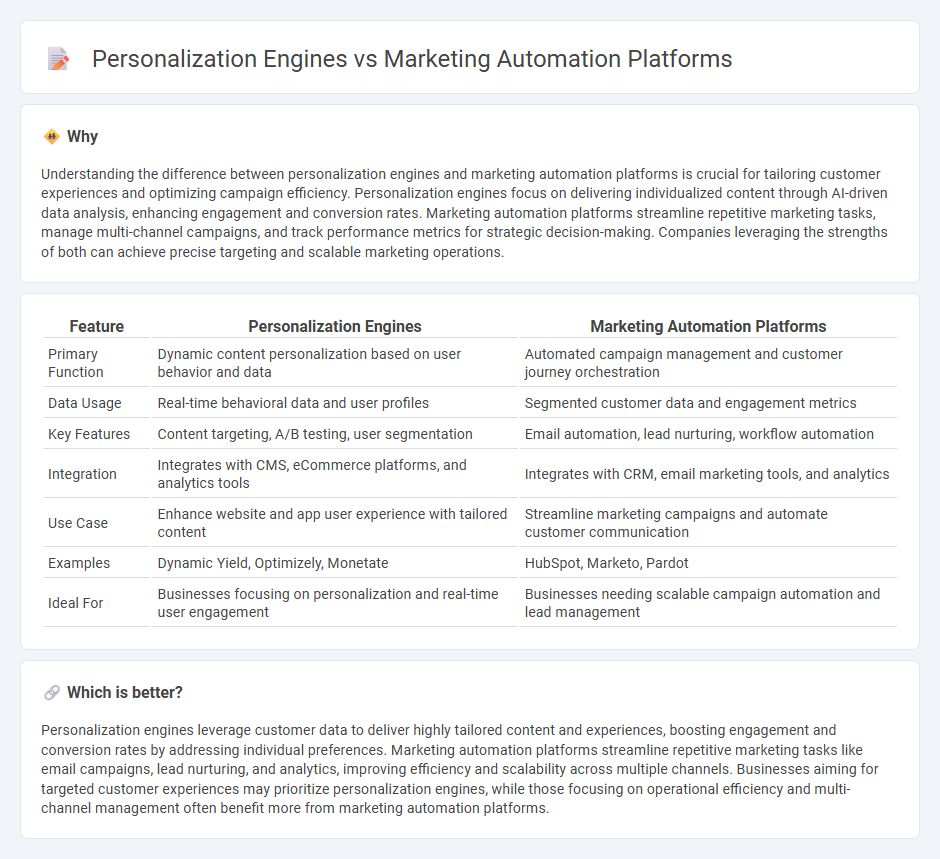
Personalization engines leverage AI to deliver tailored customer experiences by analyzing real-time data and individual behaviors, enhancing engagement and conversion rates. Marketing automation platforms streamline campaign management through automated workflows, email marketing, and lead nurturing, improving operational efficiency at scale. Discover how integrating these technologies can transform your marketing strategy and drive stronger ROI.
Why it is important
Understanding the difference between personalization engines and marketing automation platforms is crucial for tailoring customer experiences and optimizing campaign efficiency. Personalization engines focus on delivering individualized content through AI-driven data analysis, enhancing engagement and conversion rates. Marketing automation platforms streamline repetitive marketing tasks, manage multi-channel campaigns, and track performance metrics for strategic decision-making. Companies leveraging the strengths of both can achieve precise targeting and scalable marketing operations.
Comparison Table
| Feature | Personalization Engines | Marketing Automation Platforms |
|---|---|---|
| Primary Function | Dynamic content personalization based on user behavior and data | Automated campaign management and customer journey orchestration |
| Data Usage | Real-time behavioral data and user profiles | Segmented customer data and engagement metrics |
| Key Features | Content targeting, A/B testing, user segmentation | Email automation, lead nurturing, workflow automation |
| Integration | Integrates with CMS, eCommerce platforms, and analytics tools | Integrates with CRM, email marketing tools, and analytics |
| Use Case | Enhance website and app user experience with tailored content | Streamline marketing campaigns and automate customer communication |
| Examples | Dynamic Yield, Optimizely, Monetate | HubSpot, Marketo, Pardot |
| Ideal For | Businesses focusing on personalization and real-time user engagement | Businesses needing scalable campaign automation and lead management |
Which is better?
Personalization engines leverage customer data to deliver highly tailored content and experiences, boosting engagement and conversion rates by addressing individual preferences. Marketing automation platforms streamline repetitive marketing tasks like email campaigns, lead nurturing, and analytics, improving efficiency and scalability across multiple channels. Businesses aiming for targeted customer experiences may prioritize personalization engines, while those focusing on operational efficiency and multi-channel management often benefit more from marketing automation platforms.
Connection
Personalization engines leverage customer data to deliver tailored content and experiences, which marketing automation platforms use to execute targeted campaigns efficiently. Marketing automation platforms integrate these engines to segment audiences, trigger personalized messages, and optimize customer journeys based on real-time interactions. This synergy enhances engagement rates and drives higher conversion by aligning marketing efforts with individual preferences and behaviors.
Key Terms
Campaign Management
Marketing automation platforms streamline campaign management by automating repetitive tasks such as email scheduling, lead scoring, and audience segmentation to enhance efficiency. Personalization engines elevate campaign effectiveness by delivering tailored content and offers based on real-time user behavior and predictive analytics. Explore the differences between these tools to optimize your campaign management strategy effectively.
Segmentation
Marketing automation platforms excel at broad segmentation by categorizing audiences based on demographic and behavioral data, enabling scalable campaign deployment. Personalization engines leverage advanced AI algorithms to create hyper-segmented micro-groups for highly tailored customer experiences and dynamic content delivery. Discover how combining these tools can revolutionize your marketing strategies.
Dynamic Content
Marketing automation platforms streamline campaign management by delivering dynamic content based on predefined user segments and behavior triggers, enhancing efficiency in audience targeting. Personalization engines leverage advanced AI algorithms to tailor dynamic content in real time, creating highly individualized user experiences that adapt continuously to interaction patterns. Explore how integrating dynamic content strategies with these technologies can boost engagement and conversion rates.
Source and External Links
21 Best Marketing Automation Software & Tools for 2025 - This resource provides a curated list of top marketing automation tools, highlighting their features and pricing options for businesses looking to optimize their marketing strategies.
Best B2B Marketing Automation Platforms Reviews 2025 - Gartner offers reviews of leading B2B marketing automation platforms, focusing on software applications that support demand generation processes at scale.
The 9 Best Marketing Automation Software Tools - This guide lists and reviews top marketing automation software tools, emphasizing their capabilities for complex workflow automation.
Salesmate Blog - Offers insights into CRM combined with marketing automation tools, highlighting brands like Salesmate and HubSpot.
Gartner Reviews - Provides an overview of B2B marketing automation platforms, focusing on tools like Act-On and SAP Marketing Cloud.
Klaviyo Solutions - Features Klaviyo as a marketing automation platform specializing in email, SMS, and mobile push automation using AI.
Salesmate Marketing Automation - Highlights the top marketing automation tools with a focus on ease of use and subscription pricing.
Gartner B2B Marketing Automation - Reviews B2B marketing automation platforms, including Act-On and Sugar Market, emphasizing their business growth capabilities.
Zapier Marketing Automation - Lists and reviews the best marketing automation tools, focusing on features like workflow automation and customization options.
 dowidth.com
dowidth.com